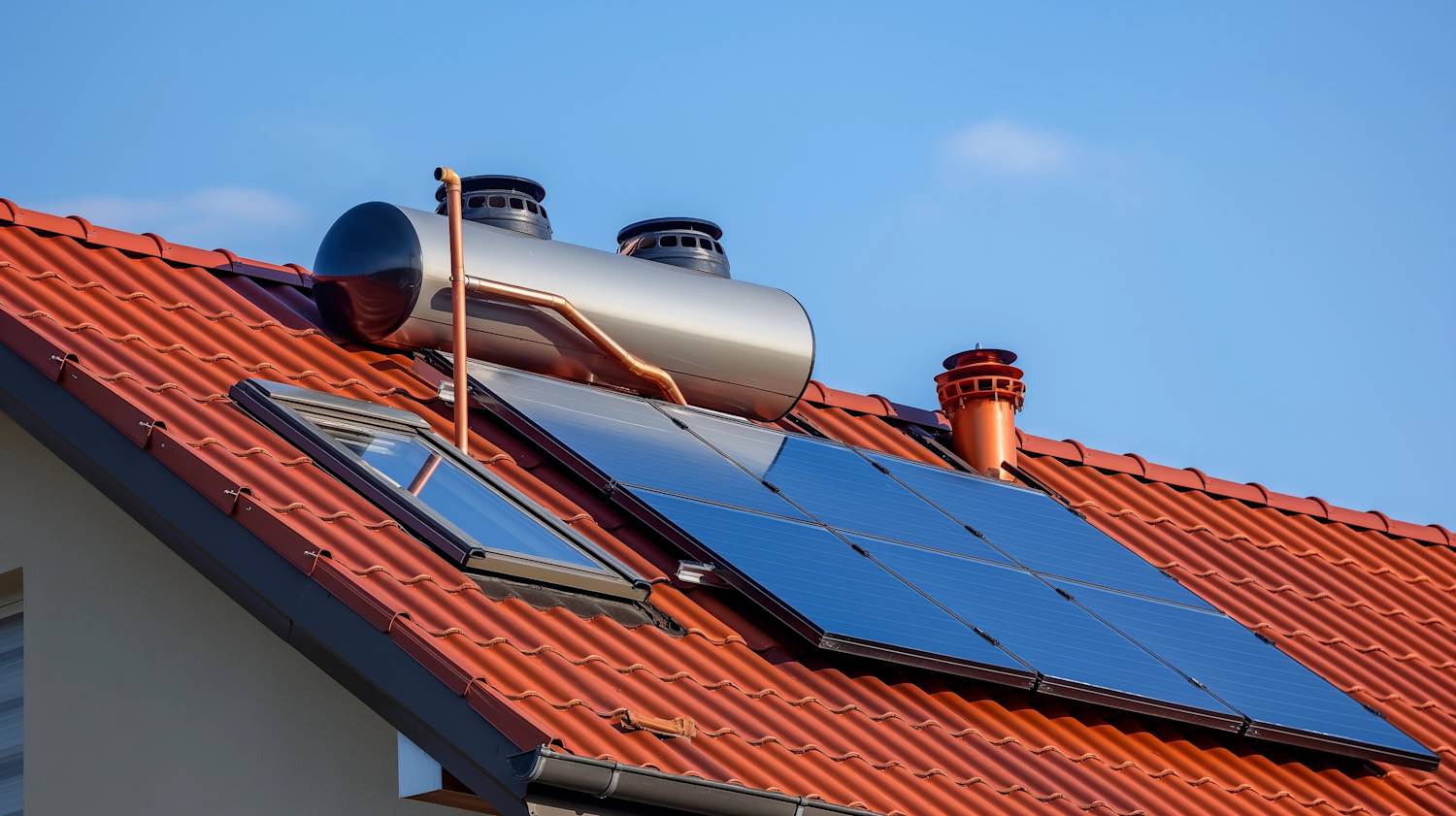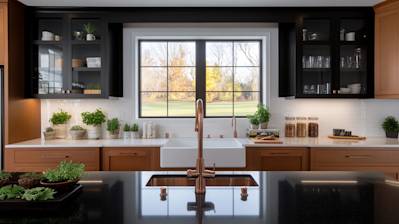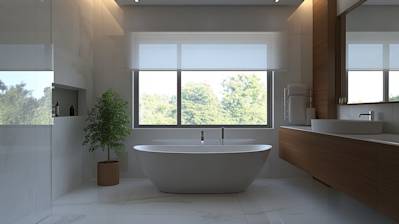If you're looking to not only save on your energy costs but also cut down on your carbon footprint, installing a solar water heater in your home is a path worth exploring. Solar water heaters harness the immense power of the sun, convert it into usable energy, and use it to heat the water used in your residence! Thus, you can rely less on traditional, pricey, and often ecologically harmful energy sources. Let's dive deep into understanding more about solar water heaters and the benefits they offer.
Understanding Solar Water Heaters
Solar water heaters, or solar domestic hot water systems, represent a cost-effective method of generating hot water for your home. They are available in a wide variety of designs, all of which include a collector and storage tank, and all powered by solar energy.
Types of Solar Water Heaters
There are primarily two types of solar water heaters:
-
Active solar water heaters: These systems use pumps and controls to transfer solar energy collected to the storage tank. Two types of active solar water heaters are direct circulation systems and indirect circulation systems.
-
Passive solar water heaters: These systems, on the other hand, use gravity and natural convection to collect and store solar energy. They generally include integral collector storage systems and thermosyphon systems.
Efficiency of Solar Water Heaters
Solar water heaters can vastly outperform traditional methods of water heating in terms of efficiency. The calculations of the efficiency of a solar water heater depend on various factors, including the amount of available sunlight, the size of the water storage tank, the type of solar collector used, and the consumption of hot water.
Maximizing Efficiency with Proper Installation
Efficiency can be maximized through proper installation and sizing of your solar water heater. You should consider factors such as solar resource availability, appropriate system size, the orientation and tilt of the solar collector, and the performance rating of the system. Local building codes and regulations must also be considered during installation.
The Benefits of Using Solar Water Heaters
Using solar water heaters comes with a myriad of benefits. Some of the notable benefits include:
-
Eco-friendly: They use renewable energy and produce zero emission, thereby reducing our reliance on fossil fuel, and consequentially minimizing our carbon footprint.
-
Cost Saving: Though the initial cost may seem high, the long-term savings in terms of energy bills make it ultimately cost-effective. The cost can be further minimized with various federal and state incentives.
-
Energy efficiency: Solar water heaters are more energy-efficient as they convert almost 80% of radiation into heat energy.
-
Durability: These systems generally have a longer lifespan compared to conventional water heaters.
Maintenance and Cost of Solar Water Heaters
Maintenance requirements for solar water heaters depend primarily on the type of system, weather, and water quality. Active systems generally require more maintenance than passive systems. Professional inspection and maintenance every 3-5 years is recommended for the longevity of the system.
Investing in Solar Water Heaters
When it comes to cost, solar water heaters tend to be more expensive to purchase and install compared to conventional water heaters. However, the potential energy savings over time can offset the initial higher costs. Moreover, various federal, state and local incentives can further lower the cost.
Investing in a solar water heater is not only an investment towards a more sustainable and eco-friendly future, but also a means of making significant savings on your energy bills. With the ever-increasing advancements in solar technology, the efficiency, longevity, and cost-effectiveness of solar water heaters are projected to improve even further.
Frequently Asked Questions About Solar Water Heaters
How do solar water heaters work?
Solar water heaters make use of the sun's energy to heat water for your home. They involve solar collectors and storage tanks. Some systems use circulation pumps and controllers, but others use natural convective currents. The systems fall into two categories: passive, which don't require pumps and controllers, and active, which do.
What are the different types of solar water heater systems?
There are two main types of solar water heaters: active and passive systems. Active systems use pumps and controllers, while passive systems rely on natural convection processes. Active systems include both direct circulation systems for climates where it never or very rarely freezes and indirect circulation systems for locations prone to freezing temperatures. Passive systems can be either integral collector storage systems or thermosyphon systems.
Can a solar water heater provide enough hot water for my home?
Yes, usually a solar water heater can provide enough hot water for a household. The size and design of the system, as well as the amount of sunlight your location receives, will play a role in determining the system's efficiency. During times of less sunlight, a backup system may be needed.
Is a backup heater needed for the solar water heater system?
While solar water heaters can typically meet a large portion of your hot water needs, there may be times, especially on cloudy or rainy days, when a backup heating source may be required to ensure a steady supply of hot water.
What factors should I consider when purchasing a solar water heater?
When purchasing a solar water heater, aspects to consider include your solar resource, the right system size, the system's energy efficiency, the cost, and the local permit and regulations.
How can I maximize the efficiency of my solar water heater?
You can maximize the efficiency of your solar water heating system by ensuring it receives optimal sun exposure, insulating it adequately, and performing regular maintenance. It also helps to use hot water mostly during the evening or night when the system won't need to use its energy to heat more water.
Do solar water heaters require maintenance?
Yes, solar water heaters require some maintenance to ensure they are working efficiently. It's recommended to have a professional check your system every 3 to 5 years. However, passive systems require less maintenance than active ones.
Can a home solar water heating system also heat my pool?
Yes, solar water heaters can also heat your pool. There are specially designed solar pool heating systems for this purpose but a comprehensive system can incorporate this feature as well.
What's the lifespan of a solar water heater?
The lifespan of a solar water heater is generally around 20 years, longer than conventional electric or gas water heaters. Their relatively long life expectancy is due in part to the fact that they are less prone to issues like corrosion.
Does installing a solar water heater increase home value?
Yes, installing a solar water heater can increase your home's market value. As energy efficiency becomes more important to prospective homebuyers, homes equipped with solar water heating systems may have a competitive advantage.
Pros of Solar Water Heaters
Energy Savings
-
Solar water heaters absorb and store light and heat from the sun, translating into substantial energy savings. They reduce reliance on traditional and more expensive sources of energy like natural gas and electricity.
-
The energy cost savings realizable from solar water heaters varies, depending on the amount of sunlight available in your location.
Environmentally Friendly
-
Solar water heaters contribute to reducing greenhouse gas emissions since they do not rely on fossil fuels.
-
Unlike conventional water heaters, solar water heaters do not produce harmful gases during operation, contributing to better air quality.
Durability and Maintenance
-
Solar water heaters typically have a longer lifespan compared to conventional heaters. With proper care and maintenance, solar water heaters can last for about 20-30 years.
-
They also tend to require less maintenance than conventional water heaters. Most solar water heater systems require a check-up every 3-5 years.
Government Incentives
- Given that solar water heaters are eco-friendly, many governments offer certain incentives such as tax credits or energy-efficient grants. These can help offset the initial high cost of purchase and installation.
Cons of Solar Water Heaters
High Upfront Costs
-
Although solar water heaters are cost-effective in the long run, they have a high initial purchase and installation cost compared to conventional water heating systems.
-
Apart from the solar water heater unit itself, additional expenses could include making alterations to your home like installing a solar hot water storage tank.
Dependence on Weather
- The performance of solar water heaters is heavily dependent on the amount of sunlight available. During cloudy or rainy days, solar water heaters might not work at their optimal efficiency, leading to a potential need for backup water heating systems.
Location Limitations
-
For one to fully benefit from a solar water heater, one's home must be in an area receiving ample sunlight throughout the year.
-
The position and orientation of your home also matter. Roofing architecture can affect installation and the efficiency of heat absorption.
Space Requirements
- Solar water heater installation requires a lot of space, both for the solar panels on the roof and the solar hot water storage tank.
While solar water heaters are environmentally friendly and can lead to long-term cost savings, the high upfront installation cost and dependence on sunlight can be limiting factors for some users.
Summary
Investing in solar water heaters draws a lot of benefits that go beyond just cost savings. These heaters utilize renewable and free solar energy, making them environment friendly as they reduce our dependency on fossil fuels. Plus, with technological advancements, they are becoming more efficient and reliable, giving you a steady supply of hot water without bearing high electricity bills. They are easy to install and maintain, advocating a practical solution for many homes.
From an economic standpoint, solar water heaters are a great investment, with a relatively short payback period. Despite their initial cost, they result in considerable savings in the long run. Government incentives and rebates also make them affordable for most households. It's a win-win situation as citizens save money while contributing to a greener future.
When it comes to sustainability and adaptation to climate change, solar water heaters are an excellent answer. These systems significantly reduce greenhouse gas emissions, tackling climate change by promoting the use of clean and renewable sources of energy. Having solar heaters installed at every home is a step closer to achieving energy independence, promoting sustainable living while creating a better and cleaner planet for future generations.
About KYPD Plumbing
Welcome to KYPD Plumbing, where we deliver top-notch plumbing solutions to our lovely neighborhood of Nicholasville, KY. Family-owned and operated, we've built our reputation on trust, quality workmanship, and exceptional customer service. Our team of certified plumbers are skilled in tackling any plumbing issue, whether it's a minor repair or a major installation. We believe in honesty, integrity, and the importance of leaving our workspaces cleaner than we found them. Find out more about our services at KYPD Plumbing and let's discuss how we can serve your plumbing needs today.
Tags: solar energy, water heating, energy efficiency,














